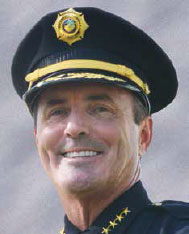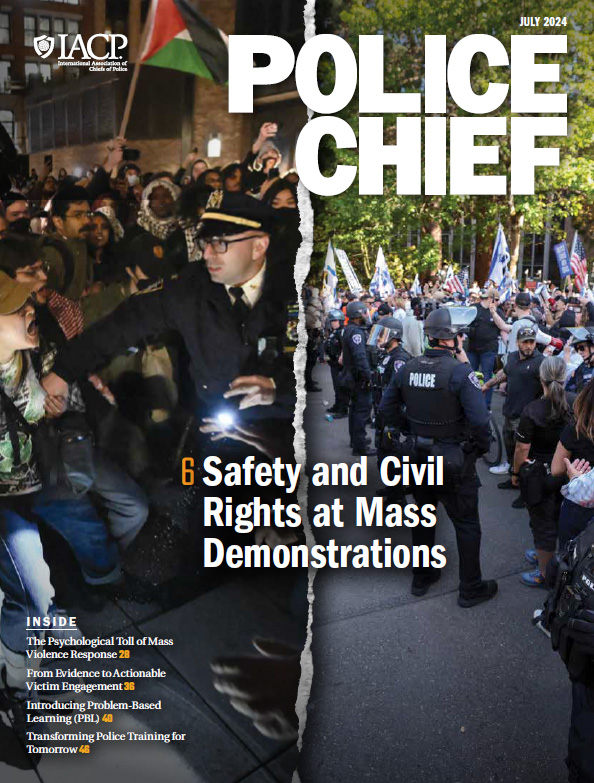 We find ourselves—as individual and collective leaders of this noble profession—at a challenging moment in history. A moment that will challenge the very best of our intentions, our dedication, our resolve—and perhaps above all—our ability to learn, to understand, to empathize, and even to evolve.
We find ourselves—as individual and collective leaders of this noble profession—at a challenging moment in history. A moment that will challenge the very best of our intentions, our dedication, our resolve—and perhaps above all—our ability to learn, to understand, to empathize, and even to evolve.
This moment demands a delicate balance required to bridge an untenable divide between not only police and our communities—but also our profession’s leadership—and our men and women on the line.
Many of the challenges our profession faced a year ago, remain today.
Policing is again being challenged to rise to higher levels of performance and dedication, as we respond to the unimaginable. As leaders, we must be idealists who believe in the goodness of our people and what they both can and desire to be.
We must enhance the trust between the police and the communities we are privileged to serve. We must strive to achieve an environment of trust—where, collectively, we are willing to put aside our fears, uncertainties, disappointments, and suspicions to create a path forward.
We will always be better standing together than we can ever be standing alone.
Law enforcement must lead and have the courage to step forward first. To lean into that vulnerable place of uncertainty that leaders must be comfortable with. We have a duty to be the leaders, the teachers, the role models, the listeners—and the extenders of respect, empathy, and dignity.
Leadership is about the willingness to meet our people, and our communities, to meet people without judgment—and with the intention of helping to guide them to a better place.
It is our duty as leaders in our profession to search for answers in new ways. This search must involve a collaborative effort and partnerships beyond our profession. Partnerships are required to provide the necessary support and services to our communities.
We must be willing to listen, to learn, and to model the empathy we expect of our officers as they engage the community. Meaningful engagement will require an uncommon patience, understanding, and empathy.
While we are collectively going through the most challenging time in policing, we cannot let the feelings and actions that resonate today be bigger than our profession’s ability to respond.
Today’s sentiment cannot be larger than the collective hearts, minds, and leadership of IACP—or the actions of the courageous men and women who proudly wear the badge.
We, as law enforcement professionals, have the responsibility to do what is right, to apply bold leadership, and the practical wisdom demanded of this moment.
It is up to all of us to change the narrative, through our daily interactions with our communities.
Law enforcement must lead and have the courage to step forward first. To lean into that vulnerable place of uncertainty that leaders must be comfortable with. We have a duty to be the leaders, the teachers, the role models, the listeners—and the extenders of respect, empathy, and dignity.
We are expected to get it right every time—that must be our quest as we work to heal and strengthen our profession and the bond we have with our communities.
The communities and the officers we serve need the best of us today, right now.
To that point, as I set out to be president of the International Association of Chiefs of Police, I plan to continue to build upon the initiatives Immediate Past President Terrence M. Cunningham laid out during this past year:
- Initiatives that focused on police legitimacy
- Initiatives to be the professional voice of law enforcement
- Initiatives that allow us to take a bold, courageous stance on difficult issues
I also plan to focus on the following initiatives:
Leadership—Our people are a product of our leadership. We must improve not only how we lead daily, but we must also develop law enforcement’s leaders of tomorrow.
Culture—As leaders we are the architects and designers of the very culture that is a key influencer on our people. We must learn and understand what that culture is—how that culture is created and how it can intentionally shape our daily mission.
Education—As a profession, we are great at training, but education moves beyond training to shaping the hearts and minds of our people. Education leads to a higher level of thought, reflection, and judgment without which practical wisdom, discernment, and justice are elusive.
I am beyond humbled to be the 104th president of the International Association of Chiefs of Police. This path has been paved by all the great police leaders who came before me. It is through our collective leadership, our passion, and our drive to be better than we are today that will shape a better tomorrow.♦


